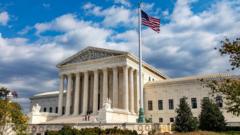The Supreme Court's narrow decision allows the Trump administration to advance its deportation agenda under the Alien Enemies Act, emphasizing the president’s powers in immigration and national security matters, much to the dissent of progressive justices.
Supreme Court Decision Fuels Trump Administration's Deportation Efforts

Supreme Court Decision Fuels Trump Administration's Deportation Efforts
The Supreme Court's recent ruling permits the Trump administration to resume deportations of Venezuelans linked to criminal gangs, raising crucial legal and ethical questions.
In a consequential 5-4 ruling, the U.S. Supreme Court has granted the Trump administration the legal authority to proceed with deportations of individuals categorized as threats under the Alien Enemies Act. This ruling specifically targets Venezuelan nationals affiliated with the notorious Tren de Aragua gang, a move that the administration claims is crucial for national security.
This recent decision resulted from the Supreme Court's vacating of previous lower court orders that had impeded the administration's ability to carry out these deportations. Moreover, the Court mandated that any future legal challenges regarding these deportations must occur in Texas, a decision that has heightened criticism from some legal experts who argue it undermines judicial check-and-balance protections.
Dissenting opinions came from three liberal justices—Sonia Sotomayor, Elena Kagan, and Ketanji Brown Jackson—while Justice Amy Coney Barrett partially aligned with them, describing the Court’s majority ruling as “inexplicable” and “dangerous.” Their concerns highlight the potential implications of allowing such deportations, particularly amid ongoing debates over immigration policies and national security.
Attorney General Pam Bondi called this ruling a “landmark victory for the rule of law” and criticized the previous judicial interventions as overreach. Supporters of the decision argue it upholds the president’s discretion in enforcing immigration laws, especially those that address perceived threats to the country’s safety and security.
As the Trump administration prepares to execute these deportations, advocates on both sides of the legal and political spectrum brace for the very real confrontation between immigration enforcement policies, judicial authority, and human rights considerations.





















